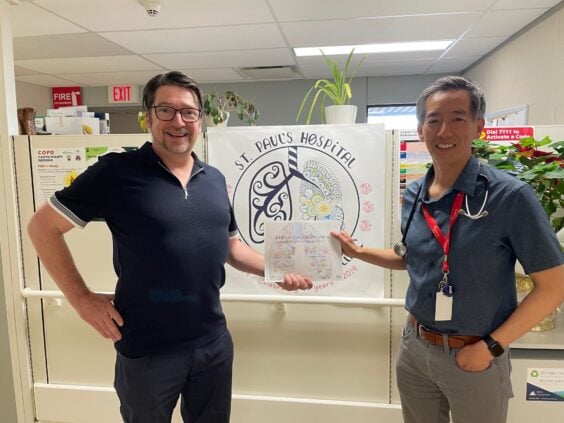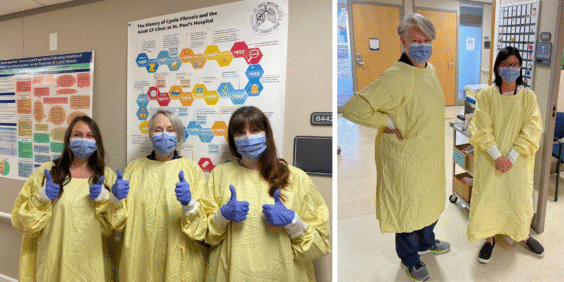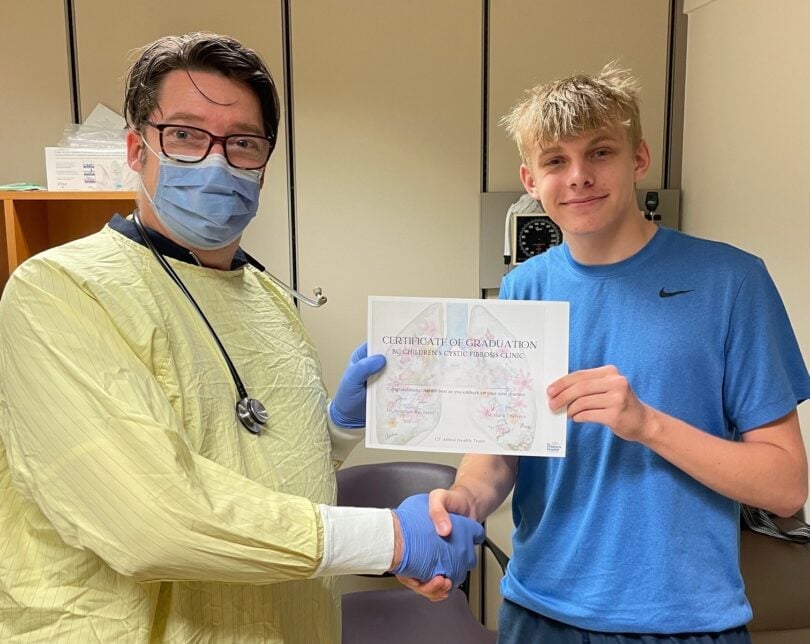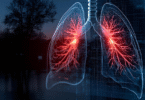As graduation caps are tossed in the air across BC and grade 12 students plan the next steps in their life, another special kind of “grad” takes place in many areas of BC Children’s Hospital — the graduation from pediatric to adult-based health care.
Some 2025 high school graduates attended the BC Children’s Cystic Fibrosis Clinic (CF Clinic)’s annual graduation clinic last month.
Cystic fibrosis (CF) is a rare genetic disease that affects the lungs and digestive system. With advances in disease management and treatment, the life expectancy for people living with CF has increased significantly over the last 40 years, and the adult program continues to grow each year. A new medication became available in 2021 that has seen dramatic health improvements with less hospitalizations and improved lung function.
Behind the scenes of a CF graduation clinic
A CF graduation clinic is a special day. Youth with CF, along with their families, attend a combined clinic with both their BC Children’s health care team and the adult health care team from St. Paul’s Hospital’s CF Clinic. This grad clinic is a time for “grads” to introduce themselves, ask questions and build trust and confidence in their new health care team as they move from one hospital and team that they have known for most of their life, to a new one. Behind the scenes, the adult and pediatric care teams collaborate to transfer the care from one clinic to the next. This process ensures high-quality continuity of care. The youth is also given their first adult clinic appointment date, which helps ensure they receive timely follow up.

In the lead up to graduation
There is a very close relationship between the adult and pediatric CF clinics in BC. Many years prior to the actual grad clinic day, the CF transition program supports youth with CF with strengthening their independence in the management of their health so that, upon graduation day, they feel confident and prepared to move to the adult program. The transition process starts at age 12 and supports the youth until early adulthood at the adult clinic.
During the transition process, the youth learn more about their health condition, including how to manage it at home and how to navigate the health care system. They also get to practice talking to their medical team without help from a caregiver; for example, they learn to explain what their medications do and when to take them, and how to answer questions about their health since their last clinic appointment.
“Our cystic fibrosis clinical program has a longstanding commitment to preparing youth and their caregivers for the change from a pediatric to adult-based health care delivery model. While the program is led by the nurse clinician, the CF specialists and multidisciplinary team all have an important role in the transition of care. And, of course, active participation by the youth and their family are key to transition success,” says BC Children’s CF nurse, Anna Gravelle.

Post-grad procedure
For a few years following the graduation, the adult CF clinic team monitors the new grads to ensure they have the extra support they might need and continue to learn about and engage with their new clinic.
Why does this process happen?
The adolescent transition process is well supported by research and is used with many different chronic diseases. By starting early and having a robust process for adolescents with chronic diseases to move from a pediatric program to an adult clinic, it improves long-term engagement with their medical team, optimizes adherence to medications and treatment, builds trust and independence and ultimately improves health outcomes.
Congratulations to the recent CF graduates!
To learn more about the transition from pediatric care at BC Children’s Hospital to adult care, visit BC Children’s Transition to Adult Care webpage.
By Melissa Richmond, Cystic Fibrosis Care BC
This story originally appeared on the PHSA website.





